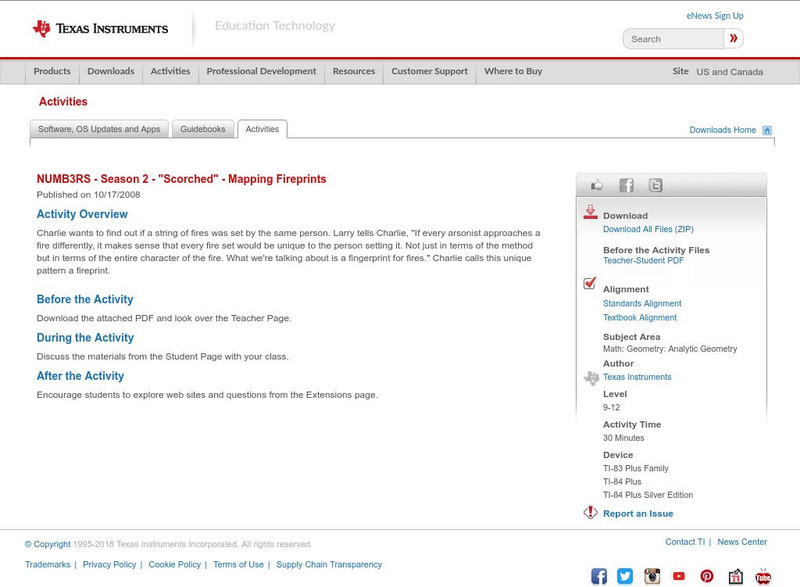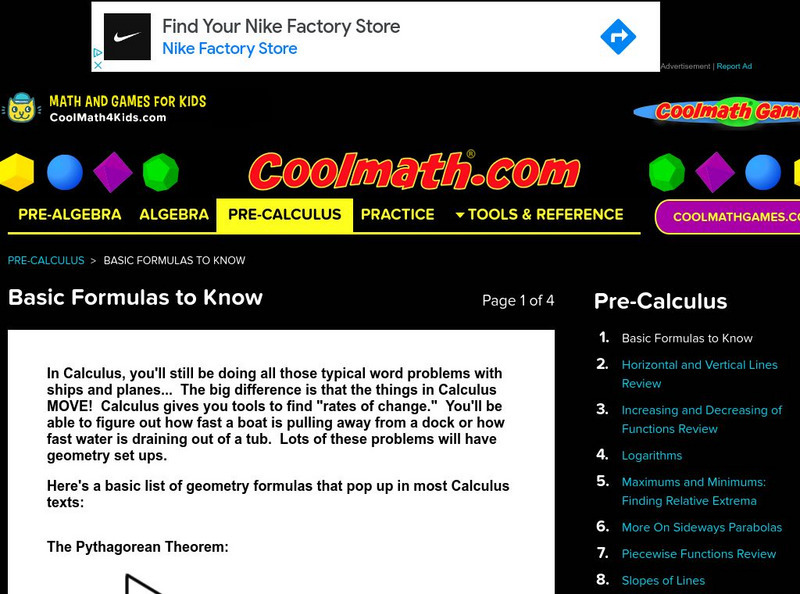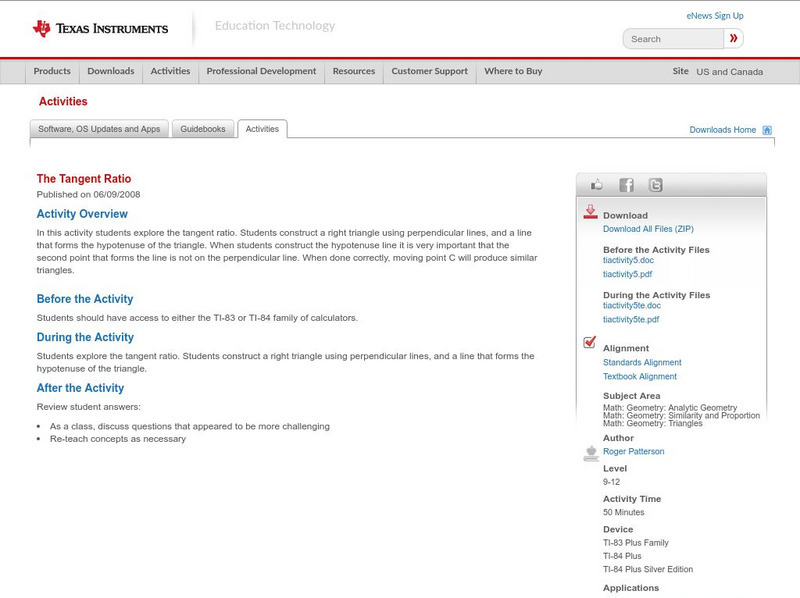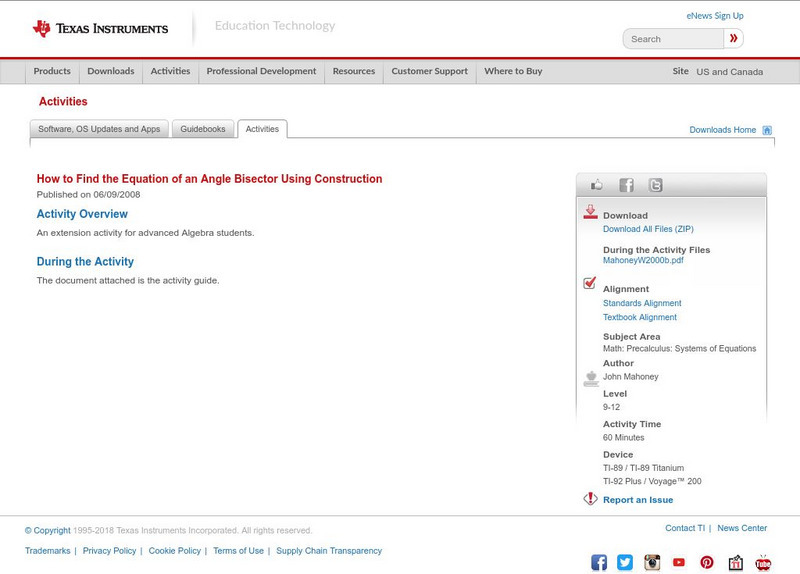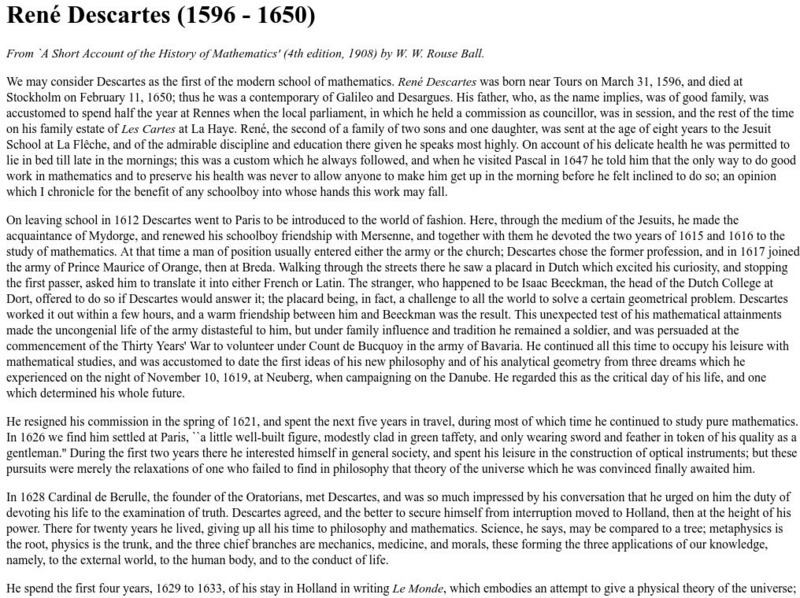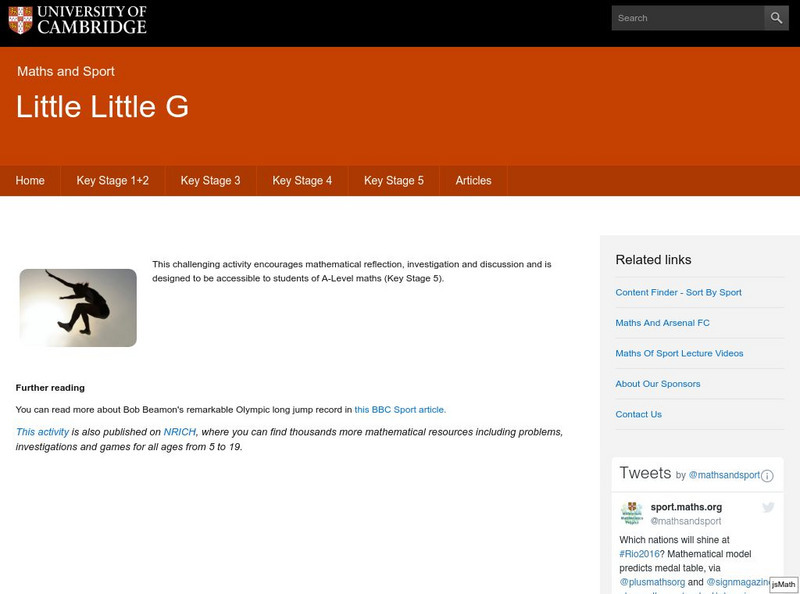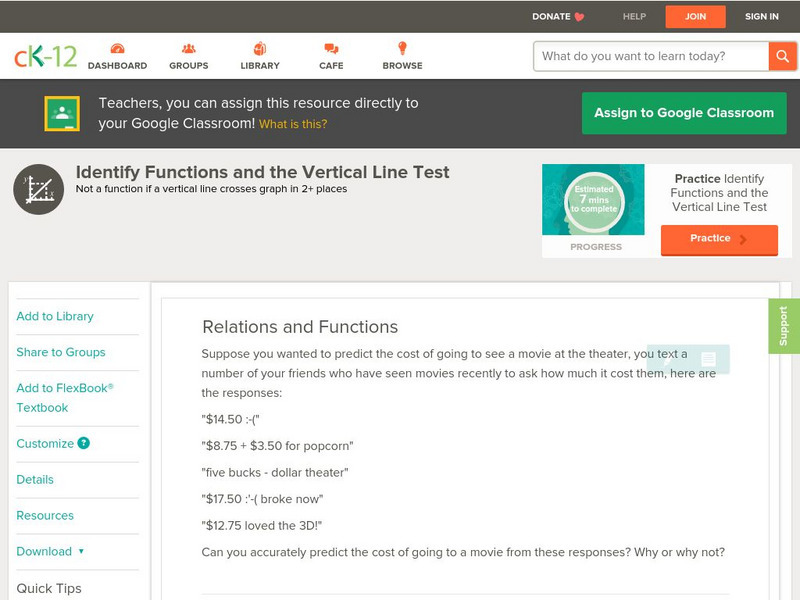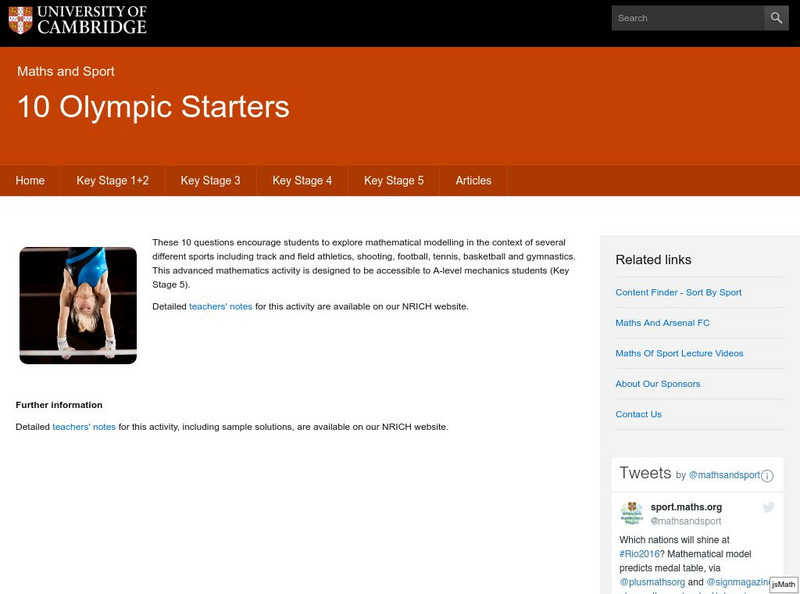Hi, what do you want to do?
Texas Instruments
Texas Instruments: Numb3 Rs: Mapping Fireprints
Based off of the hit television show NUMB3RS, this diverse lesson has students perform linear regression analysis (to compare two fire variables), check three-dimensional points using a planar equation, and evaluate points to determine...
Stanford University
Stanford University: Conventionality of Simultaneity
This site from Stanford University is on the topic of simultaneity in relativity.
CK-12 Foundation
Ck 12: Episd: Locating an Object: Distance and Displacement
[Free Registration/Login may be required to access all resource tools.] Understand how to analyze one dimensional motion by applying mathematic equations, distance, and displacement.
Cool Math
Coolmath: Precalculus Basic Formulas to Know
This CoolMath resource provides an introduction to some Precalculus formulas.
Texas Instruments
Texas Instruments: The Tangent Ratio
In this activity students explore the tangent ratio. Students construct a right triangle using perpendicular lines, and a line that forms the hypotenuse of the triangle. When students construct the hypotenuse line it is very important...
Science Struck
Science Struck: Rene Descartes: Facts, Achievements, Contributions
Presents biographical information about Rene Descartes (1596-1650), his career, personal life, written works, and his legacy. Covers contributions to philosophy, mathematics, and science.
University of St. Andrews (UK)
University of St. Andrews: History of Mathematics: Abraham De Moivre
This site contains biographical information and works of the mathematician Abraham DeMoivre.
Texas Instruments
Texas Instruments: Numb3 Rs: Where's Cheetah?
Based off of the hit television show NUMB3RS, this lesson has students set up a search region for a yacht that sank into the ocean. Using cylindrical coordinates and a little trigonometry, students are able to block off a certain portion...
Texas Instruments
Texas Instruments: How to Find the Equation of an Angle Bisector Usin
Challenge your advanced algebra or pre-calculus students to finding the equation of an angle bisector given two intersecting lines. Students can do this in several ways; the lesson plan here walks through two of them in this interesting...
Stefan Warner and Steven R. Costenoble
Finite Mathematics & Applied Calculus: Quiz: Functions of Several Variables
The online quiz assesses student comprehension of functions of several variables. The quiz consists of true/false questions on the mathematics concepts.
Trinity College Dublin
Trinity College: Rene Descartes (1596 1650)
Events of Rene Descartes' life are presented in a timeline form. The biographical information is taken from "A Short Account of the History of Mathematics" by W. W. Rouse Ball (4th Edition, 1908).
Texas Instruments
Texas Instruments: Numb3 Rs: Traveling on Good Circles
Based off of the hit television show NUMB3RS, this high-level math lesson has students delve into the topic of Great Circles on a sphere (specifically, the Earth), in order to find the shortest distances between locations. Students will...
Johan Claeys
Math Abundance: The Parabola
Defines parabolas, their properties, gives parametric equations, tangent line in a point D of a parabola, etc.
University of Cambridge
University of Cambridge: Maths and Sports: Little Little G
Could the altitude of the city hosting the Olympic and Paralympic Games have an effect on performance in the long jump? This challenging activity encourages mathematical reflection, investigation and discussion as students explore how...
CK-12 Foundation
Ck 12: Analysis: Scalar Projections
[Free Registration/Login may be required to access all resource tools.] In this lesson students will study scalar projections: dot products of vectors and unit vectors. Students examine guided notes, review guided practice, watch...
Johan Claeys
Math Abundance: The Circle: Basic Concepts
Goes over the equation of a circle, parametric equations of a circle, intersection of circle and line, tangent line in a point of a circle, etc.
University of Cambridge
University of Cambridge: Maths and Sports: 10 Olympic Starters
These 10 questions encourage students to explore mathematical modelling in the context of several different sports including track and field athletics, shooting, football, tennis, basketball and gymnastics. This activity is designed to...
CK-12 Foundation
Ck 12: Analysis: Vector Analysis Applications
[Free Registration/Login may be required to access all resource tools.] Example applications of vector analysis
Alabama Learning Exchange
Alex: Vectors Drive the Boat
Using a combination of online exploration and teacher instruction students will discover that vectors have both magnitude and direction. They will be able to use vectors to represent problem situations. Students will also be will be able...
Alabama Learning Exchange
Alex: Conic Sections: Playing With Parabolas
Through a mixture of online exploration, and teacher instruction, students will discover how parabolas are formed and will be able to use the key components from a graph (vertex, focus and directrix,) to generate the equation of a graph.
Khan Academy
Khan Academy: Divide Line Segments
Figure out the coordinates of a point between two other points that give a certain ratio. For example, find a point C so that it is two thirds of the way between point A and B.
Sonoma State University
Sonoma State University: Parallel Lines and Similar and Congruent Triangles
This site defines eleven theorems relating to parallel lines and similar and congruent triangles. Links to the theorems and relevant term descriptions are provided.
ClassFlow
Class Flow: Graph of an Equation
[Free Registration/Login Required] In 1637, Rene Descartes revolutionized the study of mathematics by joining its two major fields, algebra and geometry. With Descartes's coordinate plane, geometric concepts could be formulated...
Mathematics Archives
Math Archives: Polar Coordinates
This site, which is provided for by the University of Tennessee, Knoxville, shows you how to graph polar coordinates on a TI-85.





